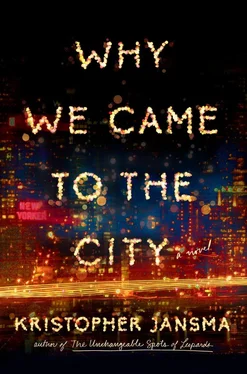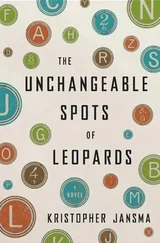George began telling them all about his star, collapsing two thousand light-years away, but then got distracted by the skinny actress as she rotated a tray of Bagel Bites in her tiny toaster oven. George left to go see if they were almost ready and then Jacob began telling him —William! — about the homeless man he’d seen on the subway that day and about how he felt silly now for getting so worked up about it. William was vaguely aware of a buzzing sound on the chair beside him. He looked down and saw Irene’s smiling face on the cell phone that lay there.
“Oh, get that?” Jacob said quickly. “That’s George’s. Irene probably got lost coming out of the subway again.”
William lifted the phone, almost not wanting to answer it because if he did, her smiling face would vanish from the display. And he’d have to think of something to say to this girl, who’d slept beneath him last week and awakened a total stranger.
He hit the green button to answer the call. “Yes? George Murphy’s phone. This is William Cho.”
There was a silence on the other end. Then, static. Then, “William?”
“Irene? Can you hear me?”
More static. Then a strange sound he couldn’t identify. “William?” she said again. William thought Jacob must be right. She sounded lost — scared.
“Hello? Irene?” he said, louder. The actors were all so loud. And the hot-water pipes were clanking above them — how could the skinny girl ever manage to sleep?
Jacob pointed to the street. “You’ll never get reception in the alley. Head out front.”
William hurried to the little hobbit door and ducked out onto the quiet sidewalk.
“… William?… Are… there?”
William raced out, past the trash cans, lined up for the morning, and the tightly bundled stacks of newspapers that were ready for recycling. He eased between the cars, parked neatly in their rows. He was desperate to hear Irene. He fought the urge to tell her insane things: that he had been missing her all weekend; that he hadn’t washed his shirt from that night because it still smelled like her. He wanted to tell her that he was sure he loved her, even though he’d only known her for eight hours, during five of which he’d been asleep.
He ran out into the dark street without even looking — if a truck had been going by, he wouldn’t have noticed until ten seconds after it had hit him.
Finally he could hear her clearly. Finally he could make out the strange noises on the other end. Full-on, reckless sobbing, more painful than any in the songs in the musical.
“Irene, where are you? What’s wrong?” He ran down the street to the corner, so he could figure out exactly where in the enormous city he was. He wished it all away. He wished every borough, block, and street away.
“William, I — William, I’m at a coffee shop across from Mount Sinai.”
William kept running. He looked around, as if maybe the hospital were nearby. And then he remembered he was in Brooklyn and it was on the East Side of Manhattan.
“Are you okay? Were you in an accident? Hold on, I’ll find a cab—”
The crying stopped, and he heard her clear her throat.
“William, I’ve got cancer. I’ve got… osteosus… I forget the name of it already. Bone cancer. This lump under my eye. Only five people in a million have it.”
He knew he ought to turn around — go back to the party and tell her friends. That was what she wanted probably. After all, they’d known her for years. He hardly knew her at all.
“You’re going to be fine!” he yelled into the phone. Not even his phone. He knew he should go back to the party and tell George. But he was still racing down the street. As long as he could hear Irene there on the other end, he knew she’d be all right. He ran past the water tower, past the pencil factory, past the Polish restaurants. He ran all the way to the water’s edge to a dark wooden pier. Black as the Styx, the East River rushed by.
“Don’t tell anyone,” she said.
He realized she was still sobbing into the phone.
“I don’t know why I even called. Don’t say anything to Sara or George or Jacob or anyone, all right?”
“I won’t, I won’t,” he was saying. “Shush.” He didn’t make a shhhhhh sound, just said, “Shush.”
It took him a second to realize that she’d begun laughing, softly.
“What’s so funny?” he wheezed.
“Nothing,” she said. “It doesn’t matter.”
He didn’t understand. He tried to catch his breath, but each inhalation was like battery acid, each exhalation like cumulus clouds leaving his lips.
“Where are you?” Irene asked, her voice a bit steadier.
He gazed across at the dark skyline. Hundreds of thousands of feet of glass and steel rose up into the blackness like a great Necropolis, and she was in there, somewhere.
“William? You know, this is stupid. I’m just going to go home.”
“No, I can’t really hear you,” he said, turning from the river to run back toward the party. “Hold on.”
Irene’s breath was in his ear again. He looked back over his shoulder at the water and the majestic city beyond it. Holding the phone tight to his ear, he ran three and a half more blocks before he realized that the signal had dropped.
At first, having cancer seemed to be largely a matter of paperwork. Irene tried to remain composed as the grandmotherly clerks at Mount Sinai looked crossly at her forms, their expressions never failing to falter as they handed her fresh ones. Irene wondered if they were having an interdepartmental Ugly Christmas Sweater contest or if the drop-stitched Rudolphs, Frostys, and Kringles had perhaps been knitted by their cats. She reminded herself to not get snippy. These people were trying to help her.
With some pharmaceutical-sponsored clipboard on her lap, Irene attempted to hold her head high without getting it in the tinsel of the plastic fir trees, or knocking the light-up snowmen from the wire branches. Christmas was consuming Mount Sinai Hospital with virulent glee. Everywhere Irene looked, she could see prickly wreaths, looping garlands, and glitzy ornaments. Stockings were hung with care in every single elevator. Toy trains looped through banks of fake snow. Handsomely wrapped gifts with oversize bows were stacked neatly in hallway corners, although these were just for show. Irene had kicked one accidentally, and the hollow tower had toppled. The décor had seemed laughable at first, and then depressing, but now, after spending an entire morning filling out forms, she was coming around to it. Who was she to judge what it took to bring a little cheer to those stuck at the hospital over the holidays? After all, she was about to number among them.
Eventually Irene was shuffled onto the sixth floor: Head and Neck Cancers. Though it seemed apropos, considering the location of her tumor, she found the little sign above the waiting area annoyingly absurd. I’ve got head cancer , she thought to herself. Cancer of the head. Just all this up here is no good at all. I’ll get myself right on the head transplant list. Pop on the head of a nice quiet schoolteacher from Ann Arbor and be done with it.
Grace, Irene had always believed, was a double-edged blade to be kept laced at her hip at all times. To appear unperturbed by all that was perturbing you eased both your own mind and the minds of those around you. So she wished to appear the cool lieutenant, marshaling the harried hospital staff as they hammered keyboard keys and strategized the times and locations for her first two chemotherapy appointments. This worked, until she caught a glimpse of her reflection in the glasses of one of the old ladies behind the counter and was thrown by how stretched and blurry she appeared: precisely the way she felt.
Читать дальше












